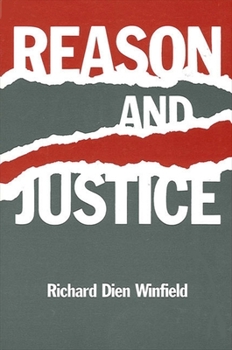Reason and Justice
Select Format
Select Condition 
Book Overview
This is a finely argued, detailed, and comprehensive systematic theory of justice, brilliantly extending Hegelian ethics much as Rawls's Theory of Justice rehabilitated and extended classical Liberalism. Winfield argues that justice, like reason, must be self-grounding, and that to achieve this, it must be self-determined. The theory of justice must therefore abandon its appeal to metaphysically given or transcendentally constituted norms and instead determine the institutions of freedom. In pursuit of this task, Winfield offers insightful discussions of property relations, morality, the family, capital and commodity relations, economic and social justice, and the state. In contrast to Liberalism, which sees the state as instrumental to non-political ends, Winfield defends the democratic state as the just realization of freedom. Throughout, it is argued that justice is defined interactively, where one's freedom is determined by how one's interactions respect and foster the institutional freedom of others.
Although the author's arguments proceed systematically, at each stage he deals adroitly with the relevant major thinkers in the Western tradition-not only with Hegel, but with the ancients, the classical liberals, Marx, and contemporaries such as Rawls.
Although the author's arguments proceed systematically, at each stage he deals adroitly with the relevant major thinkers in the Western tradition-not only with Hegel, but with the ancients, the classical liberals, Marx, and contemporaries such as Rawls.
Format:Paperback
Language:English
ISBN:0887067115
ISBN13:9780887067112
Release Date:July 1988
Publisher:State University of New York Press
Length:336 Pages
Weight:1.05 lbs.
Dimensions:0.8" x 6.0" x 8.9"
Customer Reviews
0 rating





